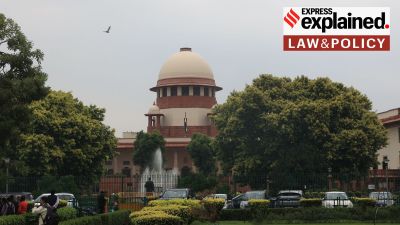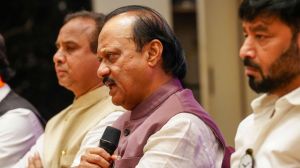Garba nights
Call it Faith or Divine Force. There's always something we Indians feel strongly for. It could be gods, goddesses, saints or even festival...

Call it Faith or Divine Force. There8217;s always something we Indians feel strongly for. It could be gods, goddesses, saints or even festivals and religious beliefs8230; We have Dussehra a fortnight away 8212; a festival following the day Navratri ends 8212; which brings to mind Rama8217;s victory over Ravana. Popularly known as the festival of nine nights8217;, Navratri means people honouring the power of Ambe Mata, worshipping and pleasing the Goddess to get rid of evils.
Among the 2,000 odd festivals that are part of the rich diversity of Gujarat, this festival boasts of resplendent enthusiasm displayed with energetic dances that include the garba8217; and the dandia raas8217;. Of course, not all believe in the philosophy the festival preaches, but it doesn8217;t come as a surprise to see a major segment of the population breathlessly awaiting the fervour and excitement that the festival is reputed to bring along. Navratri 8212; crossing the barriers of caste 8212; with roots in religion, is followed by Dussehra celebrations when many celebrate the glorious victory Rama enjoyed over Ravana.
The nine nights8217; that began with rigorous puja and fasting to appease theGoddess and witness the special power she manifests, has in recent times undergone some variation. The Goddess is still sung to; she is still feared, but the ways have registered a slight, but definite, change. For, as far as Navratri in cities is concerned, what seems more important is merry-making and dancing the night away. However, Gujarat has managed an unpremeditated effort in keeping old rituals and traditions alive. The state is once again all set to gracefully welcome the festival that would leave behind memories of times that very few can enjoy. Very few, because excepting Gujarat, there are hardly places where you could ever see nights merging with days and almost everyone looking forward to evenings where all they need to think of is to dress and dance in their best and finest.
The festival is essentially religious in nature and often sees a stream ofvisitors in temples 8212; from morning to night. The garba8217;, a circular dance performed by women around an earthenware pot called a garbo8217;, has dancers whirling with a singer and a drummer providing music. Things, however, are changing. Today, there are loudspeakers and remixes for music and the dance goes faster with every beat. Not only that, there are prizes given away to the best dancer and those dressed in the best. That which could be brought alive at small societies or large public squares earlier, garba8217; has now moved on to hotels, clubs and party plots too.
Surprises aplenty, there are times you wish to sit and stare in disbelief 8212; at the way people shop or the way they go berserk driving crazily in the middle of the night on a busy road. Though the nine night fever8217; takes over the entire state, Ahmedabad gets to see people losing a bit of their original selves to a crazy collective rapture. These nine nights are nine of a kind 8212; colleges are starved of students and offices wear a dull look. Mornings dawn not at six or seven but lazily at noon. Sleepy eyed and lethargic at work, almost everyone is more concerned about where to go in the evenings and with whom. It is also a good time for friends to socialise and to catch up with folks who have disappeared into their respective schedules the year through.
Surprisingly, parents, who normally practise restraint in letting girls out after sunset or those who frown at the ugliness8217; of the disco dance culture, never hesitate in letting their unrelenting kids join in for dandia raas8217; even late into the night.
For all those who8217;ve missed a trip to Gujarat this year, there8217;s always a next time.
- 01
- 02
- 03
- 04
- 05































